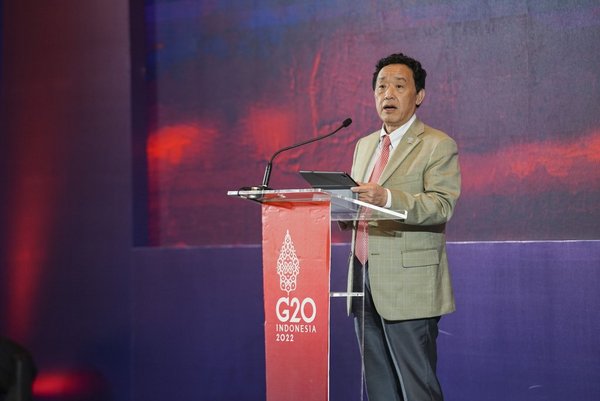- Share this article
- Subscribe to our newsletter
Agriculture ministers discuss food security
“Food is a human right.” With these words, the Indonesian Minister of Agriculture, Syahrul Yasin Limpo, opened the recent G20 Agriculture Ministers Meeting (AMM). The AMM, which was held in Bali from 27 to 29 September 2022, was the culmination of a series of meetings of the G20 Agriculture Working Group (AWG). The meeting was attended by 188 delegates, with 168 taking part in person and the remaining 20 online. All G20 member nations were represented, along with seven invited countries and eight international organisations.
The meeting took place under the Indonesian Presidency and focused on global food security and strengthening the right to food, against a backdrop of multiple crises. Russia’s attack on Ukraine, which violates international law and is impacting global food security, was central to the negotiations.
“We must take action in the short, medium and long term to accelerate the transformation of agriculture and food systems. They must become more efficient, inclusive, resilient and sustainable and ensure better production, better nutrition and a better environment, without leaving anyone behind,” Limpo said.
The meeting focused on three priorities:
- Promoting resilient and sustainable agriculture and food systems
- Promoting open, fair, predictable, transparent and non-discriminatory agricultural trade to ensure the availability and affordability of food for everyone
- Innovative agriculture entrepreneurship through digital agriculture to improve farmers’ livelihoods in rural areas
Taking joint action on the climate, food security and peace
“Transforming food systems to make them sustainable and resilient is crucial in the fight against hunger,” said Dr Ophelia Nick, Parliamentary State Secretary at the Federal Ministry of Food and Agriculture, who represented the German Government at the G20 AMM.
The G20 delegates discussed important aspects of this transformation, such as promoting sustainable agricultural supply chains, the relationship between agriculture and biodiversity loss, the role of inclusive multi-stakeholder platforms, the G20 Agricultural Market Information System (AMIS), and reducing food loss, food waste and antimicrobial resistance (AMR).
“Food policy is intrinsically linked to peace and security policy,” added Dr Nick. “Russia’s invasion of Ukraine, which contravenes international law, has clearly shown over the past few months that the global food crisis is closely intertwined with the climate and biodiversity crisis. We must therefore take joint action on the climate, food security and peace, and tackle all crises with the same vigour.”
Measures to increase the resilience of agrifood systems
“We must increase the resilience of global agrifood systems,” said Qu Dongyu, Director-General of the UN Food and Agriculture Organization (FAO) at the meeting. He highlighted a number of measures to achieve this:
Long-term measures:
- Improve early warning and early action systems
- Increase productivity sustainably
- Accelerate trade
- Find innovative solutions to tackle inorganic fertiliser supply constraints
Medium-term measures:
- Increase innovation and identify alternatives
- Invest in infrastructure to reduce inequalities
- Reduce food loss and waste
Short-term measures:
- Improve food access, including through the FAO-proposed Food Import Financing Facility, which the IMF has now taken over
- Accelerate exports from Ukraine and the Russian Federation, as per the Black Sea Grain Initiative
- Increase fertiliser availability though the comfort letters issued by the US and the new guidelines from the European Commission
- Increase the use efficiency of fertilisers through soil nutrition maps
Peace is a precondition for resilient national and international agrifood systems, according to QU Dongyu. Without peace we will not achieve Zero Hunger and the Sustainable Development Goals.
Ines Lechner, editor, Rural 21





Add a comment
Be the First to Comment